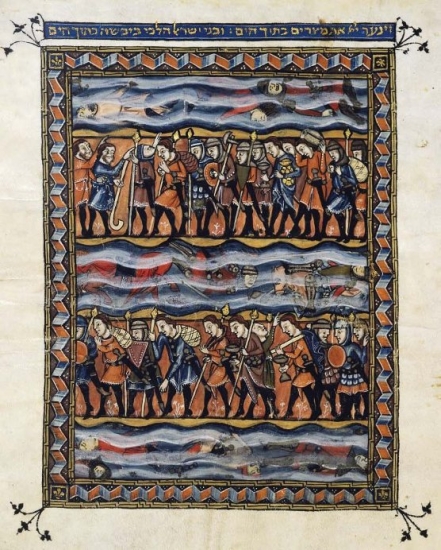
Page from a mid-13th century haggadah from Catalonia from the University of Manchester's Rylands Library. Courtesy of bibliodyssey.blogspot.com
What could bring the remaining Beatles - Paul McCartney and Ringo Starr - back together? Surprise: the David Lynch Foundation which advocates teaching transcendental meditation; 'every child,' the foundation website reads, 'should have one class period a day to dive within himself.' As part of the show at Radio City, after Ringo and Paul did a version of 'With a Little Help from My Friends,' the two performed a tune which Paul had composed on a 1968 trip to an ashram in India - 'Cosmically Conscious.' So the two former Beatles sang 'Come and be cosmically conscious, cosmically conscious with me.'
Passover is also a time of consciousness-raising, but our thoughts on it are not wholly transcendental. In all of our festival commemorations, it is the exodus from Egypt which we remember. We don't remember the G-d who created the heavens and the earth - this would be the transcendental version - but rather the G-d who took us out of Egypt. Our service avoids cosmic consciousness for a consciousness achieved through the collective experience of lived history. And we achieve that consciousness not through transcendental meditation, but through story-telling, the reading of the haggada. 'And that you may tell in the ears of your children, and of your children's children, what things I have wrought in Egypt, and my signs which I have done among them; that you may know that I am the Lord.' As the Sfat Emes tells us 'storytelling' (and 'you shall tell your children') 'leads to consciousness or da'as.' Da'as represents the capacity that Betzalel, the master craftsman, employed in building the sanctuary in the desert, joining heaven to earth.
Perhaps, out of habit, we fail to notice the novelty of seder night when the Torah turns story-telling into a mitzva. Try this for a thought experiment: you're going to create a religion, and part of that religion will be the injunction to tell a story. If there's a eucharistic moment in Judaism, it's seder night, achieved through story-telling. It's the kind of thing that a literary critic might make up! Even more strangely, we read in the haggada that even if 'we are all wise, all understanding, all experienced,' we would still have the obligation to recount the events of the exodus. Our sages tell us also that even a wise person - who finds himself alone on the night of the seder - is obligated to engage in the act of storytelling. He stays up half the night, by himself, repeating a story which he has known since childhood.
The Talmud tells us: 'in every generation, it is incumbent upon each person to see himself (lirot atzmo) as if he were leaving Egypt.' Maimonides - either he had a different version of the talmudic text or he was innovating - writes that each person is obligated to show himself (l'harot atzmo) as if he were leaving Egypt. Both versions - but that of Maimonides especially - emphasize performing the exodus from Egypt, for oneself and others. The haggada is a set of stage directions for that performance: drinking the four cups of wine, maror, matza, leaning while we eat and drink, derech cherus, our sages tell us, in the manner of free men and women. So interested are the sages in the experience of the seder that they provide actual recipes for that performance. Rabbi Yochanan says that the charoset is a commemoration of the mortar; says it is in remembrance of the apple trees under which Jewish women led their husbands despite the men’s protestations about Egyptian oppression ('We can't have kids,' their husbands objected, 'not now'). Abaye goes on to provide the recipe - food can be philosophical - for our dialectical consciousness, both that of slavery and that of redemption. 'Make sure that you pound it to make it thick' commemorates our hardship; 'add lots of wine and apples to make it sweet' recalls our eventual triumph. No transcendental meditation here; pass the apple peeler.
The seder is full of props for our performance and it's always fun to add your own (red dye for blood, marshmallows for hail are among my favorites). But despite the show, the primary means of the seder night is speech. Aristotle may say that man is the rational animal, but our tradition tells us that man is distinguished by his speech. 'And the Lord G-d formed man of the dust of the ground, and breathed into his nostrils the breath of life; and man became a living soul.' A living soul (nefesh chaya) as our tradition tells us; man is the creature who speaks. ‘Man’, says the Maharal of Prague ‘is not a purely spiritual creature - he represents a hybrid between the spiritual and physical, between the dust from which he was created and the divine breath which inspirited him.’ Descartes, having ruined everything for Europeans with a philosophy that separates mind and body, tried to make amends by suggesting that despite everything, the spirit does invest the physical in - get this for a philosophical joke – the pineal gland. The Maharal, however - no philosophical models for him, thanks - is serious when he says that the mind and the body come together in the tongue.
Though a picture may be worth a thousand words - we know that even the most humble of the people of Israel experienced a prophetic vision which was more vivid and intense than that of the prophet Ezekiel - on seder night we turn primarily to words. When the word for hearing (shmiya) is used in the Torah, Onkelos (who provides the Aramaic 'Authorized Version' and translates kabbala: Kabbala - don't think of Madonna here) explains shmiya as ‘acceptance,’ or perhaps in more psychological terms, ‘internalization.’ Though the people experienced 'visuals' on their way out of Egypt it wasn't long before they were worshipping the golden calf. How much more so in our generation do we, too, need a way of taking our own cosmic consciousness and bringing it to life. For this there is speech and the redemptive power of storytelling, and a performance that leads to internalization.
In the haggada we read: 'one who expands on the story of the exodus from Egypt is praiseworthy.' The Alter of Kelm explains that praiseworthy (m'shubach) comes from the word mashbiach - improved or refined. Through our storytelling to ourselves and our children we have the opportunity of refining and improving ourselves. We can take that transcendental cosmic consciousness, internalize it, and make it real.
 LEV-RAN SCHOOL: A LOVE STORY (new)
LEV-RAN SCHOOL: A LOVE STORY (new) DEAR EDITOR 154
DEAR EDITOR 154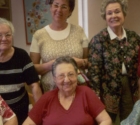 KNITTING CLUBS: TEL AVIV'S KNITTING & CROCHET SOCIAL CIRCLE
KNITTING CLUBS: TEL AVIV'S KNITTING & CROCHET SOCIAL CIRCLE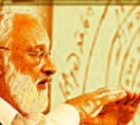 Kabbalah For All
Kabbalah For All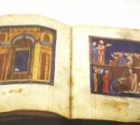 Haggadot
Haggadot Passover 5767 ...The Holiday of Freedom
Passover 5767 ...The Holiday of Freedom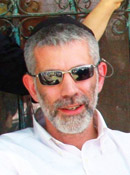 William Kolbrener
William Kolbrener